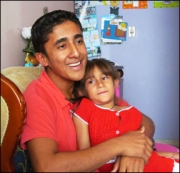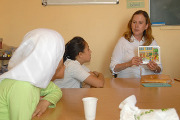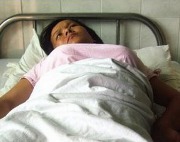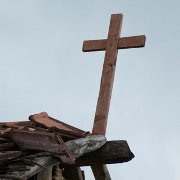‘Sweeper’ leader faces suspension, criminal charges; for others, disease, death – and murder.
LAHORE, Pakistan, July 7 (Compass Direct News) – The often unseen or unrecognized abuses suffered by Christians at Pakistan’s lowest level of society – street sweepers – have come into sharp focus this year.
 |
| Abbas Masih (photo courtesy Compass Direct News) |
While one Christian sanitation worker in Lahore has been suspended and criminal charges filed against him for objecting to discrimination against fellow workers, another was killed the same month for not tending to a shopkeeper’s command fast enough.
Anayat Masih Sahotra, who has worked as a street sweeper for Lahore’s Solid Waste Management (SWM) department for 24 years, said he is facing baseless charges of forgery and fraud from his employers because of his work as a labor leader for area sweepers, who are nearly all Christians. He was suspended and accused of the crimes on May 14 after he asked SWM Managing Director Wasim Ajmal Chaudhry to fulfill a promise to make 400 Christian workers regular employees with full benefits, he said.
Sahotra said when Chaudhry refused his request to make the Christian sweepers regular employees according to the requirements of Pakistani law, he told the managing director that he could expect protests. Protest against injustice was their civil right, he said, and plans for a demonstration were underway when he received the suspension order alleging forgery and fraud.
When he went to Chaudhry’s office again on May 26 to object to the injustice of the suspension order, he said Chaudhry referred to him and other Christian workers asChuhras, an offensive term of contempt for street sweepers, an occupation assigned only to those of such low “untouchable” social standing that they are below the remnant caste system predating Pakistan’s predominantly Islamic society.
“I know you low-born Christian Chuhras, and I know how to deal with you,” Sahotra said Chaudhry told him.
Sahotra left Chaudhry’s office, he said, only to receive a phone call a few minutes later from SWM Assistant District Officer Faiz Ahmed Afridi telling him to come to his office. Sahotra went to Afridi’s office in the evening, where he was offered to sit and have a cup of tea, he said.
“While I was taking tea, police entered the office and arrested me,” Sahotra said. “I was shocked how cunning Faiz had been to me.”
Charges were filed the same day at Islampura police station, accusing Sahotra of criminally intimidating Afridi, though Sahotra said he was calmly taking tea when police arrested him.
The next day Sahotra was granted bail, but a few days later Anarkali police called him, saying the superintendent of police wanted to talk to him.
“The police of Anarkali are tricking me into meeting them,” he said. “They want to arrest me on any other charge in order to mount pressure on me to withdraw my support to the Christian employees who are not being made regular despite having worked there for several years.”
As temporary or “work charge” employees, the sanitation workers’ contracts expire every 88 days, and they are hired every third month. This goes on for decades, with the employees working until they are too feeble to do so without any benefits or pension. They get no days off – no weekends, no holiday, no sick leave.
Their morning shift begins at 6 a.m., but the general public does not want them working when they are awake, so the sweepers prefer to clean streets beforehand. Starting at 4 a.m., they work until 7 p.m. for US$100 per month, leaving them no opportunity to work any other part-time job. Thus they are kept poor, with no opportunity to provide quality education to their children, who
perpetuate the cycle as they too become sweepers.
Murdered Sweeper
The deep, culturally-rooted disparagement Christian sanitation workers suffer was apparent in another incident in May. Abbas Masih, 36, was cleaning the streets when he was murdered for not picking up trash quickly enough, human rights advocates said.
Eyewitnesses said Masih was cleaning streets in the Pir Maki area of Lahore on May 21 when Muhammad Imran, an Arain or agricultural caste member who worked at a flower shop, told Masih to pick up dried leaves and flowers from in front of the shop. Masih told him that he would gather them up when he came back from the end of the street.
“How can a Chuhra argue with me?” Imran said, and he took out a knife used at the flower shop and shoved it into Masih’s heart, according to the witnesses. Masih fell. He was taken to a hospital, where he died.
Two brothers who own the shop, Muhammad Tariq and Muhammad Shehzad, told Compass that Imran had opened the store that morning. Imran asked Masih to pick up a small pile of dried leaves and flowers and take them away with the garbage, they said.
As witnesses also noted, they said Masih told him that he would pick up the trash upon his return from the end of the street. Imran insisted that he pick up the pile immediately.
“Imran called him names and then took out the knife and stabbed the heart of Masih,” Shehzad said, adding that he was at home at the time but heard about it from another who came home from the scene of the incident. “I rushed to the spot, picked Masih up, put him in a rickshaw and rushed him to the Mayo Hospital. I also phoned the emergency police, Rescue 15, and informed the shop that Muhammad Imran must not be allowed to go, as Masih had passed away in the hospital.”
He said that Masih was “a very good person.”
The Lower Mall police station registered a First Information Report (FIR) only after several Christian leaders protested.
Although Masih had worked with SWM for 16 years, he remained a work-charge employee, so his family was not eligible for financial assistance upon his death. Several Christian leaders protested to the Chief Minister of Punjab Province, whose office in turn wrote to the SWM.
Based on feedback from the chief minister’s secretariat, in a June 9 letter the SWM responded to the Christian leaders: “It is the policy of the government to grant financial assistance to the family of deceased civil servants, and work charge employees do not fall under the definition of civil servants. However, on the death of work charge employees during their engagement, it is the practice to pay financial assistance after getting the approval of the Chief Minister as a special case.”
The chief minister has not responded to the request, and Christians said there is little possibility that he will consider it.
Though Christians account for 90 percent of sewage workers and an even high percentage of sweepers, they make up only 2.45 percent of Pakistan’s population, which is more than 95 percent Muslim, according to Operation World. Masih’s widow, Rukhsana Masih, said that she and her family members had feared filing a police report about the case – Pakistani police are notorious for falsely charging or otherwise harassing marginalized minorities like Christians – and that they were too poor to retain a lawyer. The Community Development Initiative, an affiliate of European Centre for Law and Justice, has since allayed her fears about the legal process and offered to assist her, and she has agreed to pursue justice.
Overlapping Religions
When the Indian subcontinent was divided in 1947 and Pakistan was carved out in the name of Islam, ultimately there was a merging of Brahmanic Hinduism’s ritual impurity with Islamic ceremonial uncleanness in regard to sweepers – almost all of whom were Hindu “untouchables” who converted to Christianity in the late 19th century.
This synthesis, however, came about over time. Initially the founding father of Pakistan, Muhammad Ali Jinnah, had no notion of bringing religion into the sphere of political life. He was also an advocate of ending caste-based discrimination. With Jinnah’s early death and the use of Islam for political gain by migrating, Urdu-speaking leaders who previously had no political bases here – in particular the first prime minister, Liaquat Ali Khan – over six decades Islam permeated every aspect of life: social, political, economic and legal.
After Pakistan became fundamentally Islamic, Muslims confused the notion of ceremonial uncleanness – considered temporary in nature in Islamic jurisprudence – with the Brahmanic notion of ritual impurity, considered innate and permanent. Islam forbids eating and drinking with a kafir or infidel, but it allows it with the “people of the Book.” But as caste-based “untouchability” became confused with the Islamic notion of ceremonial uncleanness, Christians also came to be seen as ritually polluting a person or a thing.
Thus contempt toward Christians is deeply rooted, and there is no legislation to arrest this hatred. Rather, the state appears to want to keep Christians in this degrading occupation. Several job advertisements from government departments clearly state that sweeper candidates must be non-Muslim; some even specify that they must be Christians.
The Pakistani government hasn’t evolved any modern system of maintaining hygiene in metropolitan areas, so Christian sweepers are forced to collect and discard garbage under filthy conditions. Rotten and stinking garbage is a source of several contagious diseases, and most of the sweepers have respiratory and skin problems. A large number of them suffer from tuberculosis and hepatitis B.
One reason Sahotra is struggling to get these workers full employee status is that as temporary workers they are not entitled to any Social Security Hospital. They are not considered government employees and hence are not entitled to treatment in hospitals for government employees.
The same situation prevails at the Water and Sanitation Agency (WASA), which maintains the sewage system, where about 90 percent of workers are Christians. They face extremely dangerous work conditions. When sewer lines clog because they are too small, these workers are not provided any protective gear as they sometimes dive 30 to 50 feet below ground into manholes filled with dirty and toxic water. When a sewer line gets unclogged, the strong flow sometimes carries away the worker.
Several sanitation workers have lost their lives due to toxic gasses in manholes. Overall, hundreds of people have lost their lives working for WASA, but their families do not receive the benefits that other government employees get because the workers do not have regular status despite working decades for the department.
Caste-Based Blasphemy
One reason missionaries had such success in converting area Hindus to Christianity in the late 19th century was that conversion offered the community a way to socioeconomic as well as religious emancipation.
Although a large number of Christians managed to escape the bondage by attaining education, still an overwhelming number of Christians were caught in an occupation that society rendered humiliating and degrading.
Several cases of Christians falsely charged under Pakistan’s “blasphemy” laws have been rooted in such caste-based discrimination.
Asia Noreen (also known as Asia Bibi), sentenced to death in November 2010 for allegedly insulting the prophet of Islam, was working in the fields picking fruit when she took water from a bucket for all workers. Her co-workers argued that she had polluted the water by touching it, and that the water would be drinkable only if she converted to Islam. When she answered, they ensnared her in a blasphemy case.
Remnant Hindu Brahmanic notions of untouchability combined with Islamic fervor for conversion in Pakistan also figured in accusations of blasphemy against Rubina Bibi in Alipur Chatta, Punjab Province. She had bought ghee, an Indian oil used for cooking, but when she felt it was adulterated, she told the shopkeeper to return it and give her money back. The shopkeeper argued that the oil had been polluted for having been poured into the bowl of a Christian, so it could never be returned. The ensuing argument veered into religious issues that ultimately invoked Pakistan’s blasphemy laws.
The hierarchical sense of superiority that marked Imran’s alleged murder of Abbas Masih was also present in the ransacking of Christians’ homes in Bahmaniwala, Kasur, in June 2009. Trolley driver Sardar Masih asked Muhammad Hussain to remove the motorbike that he had parked in the middle of the road. Hussain refused, asking how a “Chuhra” could give him an order.
The argument grew into a brawl between two families, with the inevitable accusation from the Muslims that the Christians had committed blasphemy. The entire Christian population of the village fled, and Muslims ransacked their houses.










